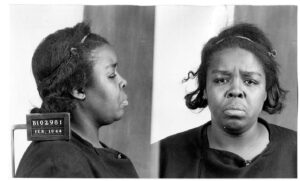
On Nov. 16, 1944, Helen Ray Fowler died in Sing Sing prison’s electric chair, becoming the only Black woman legally executed in New York State.
Her death at age 37 followed a guilty verdict that even the jury wasn’t convinced was just.
Fowler, a mother struggling to raise five children while her husband was off at war, was innocent of the murder that consigned her to death, according to a new play that debuts in February at Bethany Arts Community in Ossining.
Ossining Village Historian Joyce Sharrock-Cole spent the past year digging into Fowler’s past in a quest to right a historical wrong. The result is The Execution of Helen Ray Fowler.
The two-act drama, on which Sharrock-Cole collaborated with playwright Misha Templar Sinclair, will be presented over two weekends in February. Actress Donna James leads a 15-member cast under the direction of Mel Hancock.
The play grew out of a presentation by Sharrock-Cole, a lifelong Ossining resident, about four women who were executed at Sing Sing.
“Their stories were so compelling, I said these stories have to be told,” said Sharrock-Cole, curator of Bethany’s annual Black History and Culture exhibit. “Most people don’t even know women were at Sing Sing nor that they were executed and what life was like for them.”
Donna James, of Ossining, has appeared in many local productions, including recently at Lindhurst After Dark at the Gothic Revival mansion in Tarrytown. She also portrayed Madam CJ Walker in Sharrock-Cole’s exhibit at Bethany.
Death sentence
Helen Fowler ran a boarding house in the red-light district in Niagara Falls when, according to Bethany’s production, “a fit of jealousy and a series of bad decisions results in a man’s death.”
The victim was William Fowler, who Helen Fowler was not related to, although press reports and even her own death certificate listed him as her husband.
William Fowler was out for a night on the town in Niagara Falls on Oct. 30, 1943, when he was killed by a blow to the head during a robbery at Helen Fowler’s rooming house, according to press coverage. She and one of her “hothead” boarders, George Knight, were charged with first-degree murder.
A motion by the defendants to separate their trials was denied. After three days of conflicting testimony, Fowler and Knight were convicted of murder — but not before the jury asked the judge whether two people could be found guilty of murder when only one had done the killing. The judge instructed them that both parties engaged in the commission of a felony were equally guilty.
A week later, Fowler and Knight were sentenced to die in Sing Sing’s electric chair, infamously known as “Old Sparky.”
Several appeals by Fowler and her lawyers failed to obtain a new trial or prevent her execution. She was one of four people executed at Sing Sing that night, including her co-defendant and two other men.
“She was guilty of moving the body but in today’s standards she wouldn’t have died for it. She didn’t kill him,” Sharrock-Cole said. “She wasn’t guilty of the crime.”
Fowler’s body was unclaimed by her family after her execution and she was supposedly buried by the state in Adams Corners in Putnam County, although Sharrock-Cole said there was no record of her body there.
Press coverage about Fowler’s life “doesn’t do her justice,” Sharrock-Cole said, portraying her as “this brute woman” and inaccurately speculating on her relationship with her children and with the man who committed the murder.
“The fact that her case was the first case in the Niagara Falls area that included female jurors is big, and the fact that you call up there and no one knows this case baffles me,” she said.
Sharrock-Cole added: “With the review recently of the criminal justice system, so much has been talked about, that’s why it’s so relevant today. By today’s standards, would she have met the same fate? How would they have treated it? And the fact that she was in jail in February, dead by November, and people accused of the same thing, other women were in there for a really long time before they were killed.”
Describing the play about Fowler’s life, Sharrock-Cole said: “There’s so much that people can see themselves in. A woman raising her children, and how hard it is without your husband at home, and it talks about loneliness, and it goes into a little bit of the trauma of her life.”
Highlighting Black history
The play is part of Bethany’s Black History & Culture: Black Presence. Profound Influence exhibition highlighting Black contributions throughout American history, which runs from Feb. 2 through March 8.
The exhibition, curated by Sharrock-Cole, includes oral history accounts and genealogical research to unearth the stories of Black entrepreneurs and Black organizations from all facets of the community’s business and social life.
Programming will include talks, a film screening, guided tours, and a living museum with local actors. Events will take place in person, online, and traveling throughout the year with the exhibition’s History Walls.
If you go:
- What: The Execution of Helen Ray Fowler
- When: Friday, Feb. 16 at 7 p.m.; Saturday, Feb. 17 at 7 p.m.; Sunday, Feb.18 at 3 p.m.; Friday, Feb. 23 at 7 p.m.; Saturday, Feb. 24 at 7 p.m.; Sunday, Feb. 25 at 3 p.m.
- Where: Bethany Arts Community, 40 Somerstown Road, Ossining
- For mature audiences only. Highly suggested for audiences 18 and older
- Tickets: $30 general admission; $25 senior/student
- Information: bethanyarts.org/calendar/helenrayfowler/
- For more about Black History & Culture: Black Presence. Profound Influence, visit bethanyarts.org, call 914 944-4278 or email info@bethanyarts.org